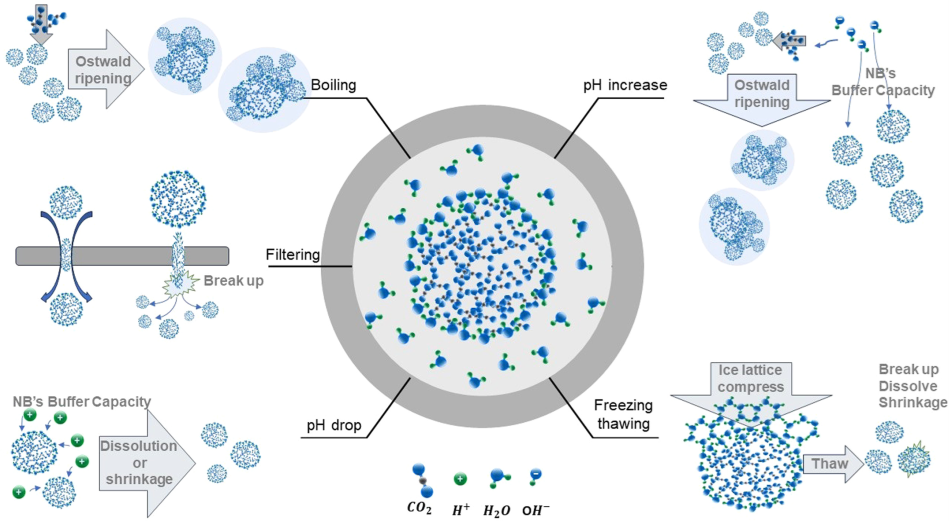Creation and application of charged nano bubbles
Nanobubbles (NBs), minute gas-filled cavities within liquids, were first hypothesized approximately 30 years ago. Despite initial skepticism regarding their existence, advancements in detection techniques have now enabled their unequivocal identification and measurement in aqueous environments. The first Atomic Force Microscopy (AFM) image of NBs was captured in 2000, followed by the first cryo-Transmission Electron Microscopy (cryo-TEM) image in 2010. Since then, research on NBs has significantly expanded, particularly in the fields of chemical engineering, materials science, and physics. Notably, interest in the interactions between NBs, calcium carbonate, and magnetic fields has intensified since 2019, underscoring their relevance in mineral processing, water treatment, and other industrial applications. This research will deepen our understanding of nano bubbles, paving the way for their optimized use in industrial, environmental, and medical applications. By elucidating the stability mechanisms and generation methods, we can enhance their practical utility and develop innovative solutions to complex challenges.
Research challenges
This proposal seeks to investigate the complex characteristics and applications of NBs, increase their number density and surface charge. It focuses on the following key areas:
Generation Methods: Assess various NB generation techniques, including hydrodynamic cavitation, ultrasonic cavitation, pressurization-depressurization, electrolysis, and the porous membrane method. Additionally, evaluate methods for capturing and concentrating NBs in magnetic bottles.
Stability Mechanisms: Explore the factors contributing to the stability of NBs, emphasizing their charge properties and the role of zeta potential.
Molecular Dynamics and Characterization: Utilize advanced spectroscopy and molecular dynamics simulations to analyze the interfacial properties and behavior of NBs.
Applications in Calcium Carbonate Systems under Rotating Magnetic Fields: Investigate the impact of NBs on calcium carbonate nucleation, scaling inhibition, and hardness reduction, with particular attention to their interactions with rotating magnetic fields.
Each area presents unique challenges that require a multidisciplinary approach to fully understand the potential of NBs.
Your assignment
You will analyze various methods for generating nanobubbles (NBs) and investigate their stability. These methods may include, but are not limited to, hydrodynamic cavitation, ultrasonic cavitation, pressurization-depressurization, electrolysis, and porous membranes. After successfully generating NBs with different sizes and charges, you will focus on their application across several industries, with a particular emphasis on water treatment, considering their chemical activity. Your specific tasks will include working with ozone nanobubbles to degrade pollutants and improve water quality. Additionally, you will explore whether NBs can enhance mineral extraction efficiency in diluted solutions. You will design and conduct experiments in the following areas: stability studies of NBs using zeta potential measurements and advanced spectroscopy (FFF-MALS), comparison of generation methods, capturing of NBs in magnetic bottles, and examining the influence of NBs on scaling. Molecular dynamics simulations will also be employed to study the dynamics of the interfacial layer of NBs at the molecular level.
Your Profile
You have an MSc degree in physics, chemistry or a related field and a solid knowledge of spectroscopy. Ideally you have experience in working with nanobubbles or nano particles, ultrasound, magnetic fields and high voltage, and molecular dynamics simulations. You speak English fluently.
Keywords: Nano bubbles, zeta potential, charged water
Supervisory team: Promotor: Prof. dr. Herman Offerhaus, Co-promotor: Prof. Dr. Jakob Woisetschläger, TU Graz
Wetsus supervisor: dr.ir. Elmar C. Fuchs
Only applications that are complete, in English, and submitted via the application webpage before the deadline will be considered eligible.
Guidelines for applicants: https://phdpositionswetsus.eu/guide-for-applicants/
